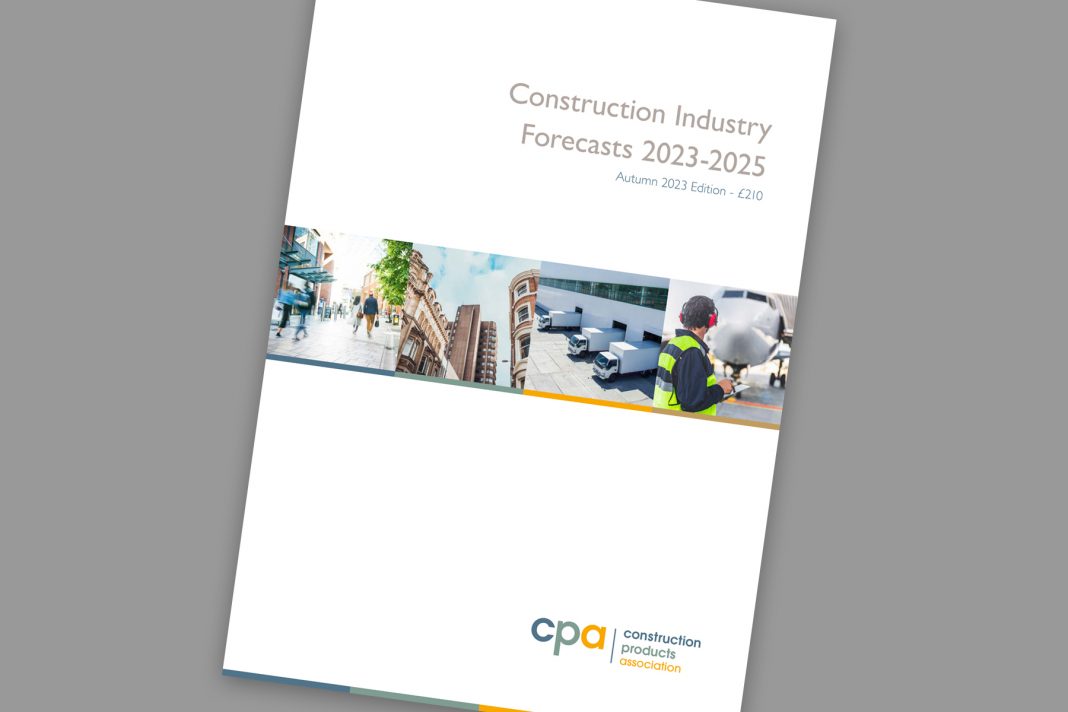The end is not yet in sight for the expected recovery in construction output with a forecast 0.7% growth now downgraded to a contraction of 0.3% due to a weaker economic backdrop.
Interest rates have probably peaked, says the Construction Products Association in its Autumn forecasts, but it anticipates they will remain at this level until 2025 as a result of stubborn inflation.
The UK economy is expected to flatline throughout 2024, holding back the recovery in major sectors such as new build housing and RMI to 2025.
Private housing is the sector forecast to be the worst affected by prevailing economic conditions this year with the sharp increase in mortgage rates since the end of last year leading to house builders reporting a 30-40% fall in demand.
“Interest rates and mortgage rates are expected to remain high for longer and adversely affect demand throughout next year,” says the organisation. “As a result, after a 19.0% fall in completions and output this year, completions are forecast to remain flat in 2024 with no growth until 2025. Whilst the balance of risks to private housing clearly remains on the downside, a positive policy stimulus in the Chancellor’s Autumn Statement would help demand to start to recover next year.
“Private housing RMI is the second-largest construction sector and activity continues to be on a general downward trend after the ‘race for space’ spike between 2020 and 2022. Output is forecast to fall 11.0% this year. As with new build housing, the weak economic backdrop in 2024 will limit the pace of recovery, with a weaker housing market reducing transactions-related improvements and a notable fall in new planning applications for larger improvements work.
“This will keep construction output flat in 2024, which is a downgrade from the 2.0% growth expected in the Summer Forecasts. Energy-efficiency retrofit – primarily insulation and solar photovoltaic work – continues to remain strong; however, whilst there are government programmes such as ECO4, the Great British Insulation Scheme and the Boiler Upgrade Scheme in place, there are still questions over their delivery.
CPA head of construction research Rebecca Larkin said: “With only a couple of months left in a difficult year for construction and looking forward to 2024, the evidence suggests it will still be a while before the clouds begin to lift. Both new build housing and RMI have taken a significant hit from rising interest rates, falling real wages and weak economic growth. Although further rises in interest rates now appear off the table, the prospect of rising oil prices keeping inflation elevated suggests rates are likely to remain at peak for longer and throughout next year. This will keep demand subdued for house purchases and improvements. It will also create a step-change in financing costs compared to the record-low rates of the past decade for new commercial and industrial projects that is likely to limit appetite for investment and development.
“With infrastructure now set for two years of flatlining activity, it does shine a light on the importance of major projects as a driver of growth in the sector and for construction overall. In particular, government’s chopping and changing on infrastructure spending decisions this year has removed roads, rail and offshore wind projects from the near-term pipeline and has further weakened the industry’s confidence that government announcements can translate into tangible delivery.”












